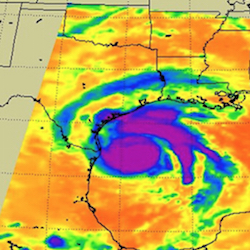
A new report that is critical of Texas assisted living operators’ preparedness and response to Hurricane Harvey in 2017 is misleading to the public and insulting to industry workers, according to associations representing assisted living operators in the Lone Star State.
For its “Left Adrift” report, AARP Texas said that it requested “Harvey-related complaints” from the Texas Health and Human Services Commission and learned that eight assisted living facilities had complaints made against them. Of these facilities, six had substantiated violations. At two of the six facilities, however, complaints were not specifically related to the hurricane, AARP Texas said.
“Based on a review of these complaints, it is clear that emergency preparedness requirements and enforcement for assisted living facilities (ALFs) operating in Texas should be strengthened to protect the lives and well-being of residents,” the report stated.
The publication discusses the cases of four assisted living communities where post-hurricane inspections were conducted in response to complaints about the evacuation of residents. One of the communities is La Vita Bella in Dickinson, TX, which made the news last year when a photo of residents sitting waist-deep in water went viral on Twitter. The facility ultimately was fined $550 for violations, according to the report.
“In just the complaints reviewed, several assisted living facility residents faced harm, neglect or abandonment during Hurricane Harvey and its aftermath,” the report said. “Yet the facilities responsible for the residents’ safety faced little, if any, consequence for their failure to protect vulnerable residents.”
Industry associations, however, told McKnight’s Senior Living that the report does not accurately portray efforts during the natural disaster.
“Using the challenges and unfortunate incidents experienced by a handful of the hundreds of assisted living facilities in the affected region to negatively represent an entire industry is misleading and unfair,” Kevin Warren, president and CEO of the Texas Health Care Association, the state affiliate of the American Health Care Association / National Center for Assisted Living, said in comments that were echoed by his colleagues at other associations. “The circumstances cited in the AARP report were serious and regrettable, but suggesting they reflect the cumulative work of thousands of assisted living and long-term care workers who rose to the occasion is inaccurate and harmful,” he added.
In addition to supporting recommendations issued in March by the Texas HHSC, the AARP report issued four of its own recommendations:
- Ensure that fines associated with emergency preparedness are sufficient to deter violations.
- Strengthen the requirements for assisted living communities’ written emergency plans.
- Require that assisted living operators notify the Texas HHSC of damaging or flooding.
- Mandate that Texas HHSC inspect all communities with damage or flooding.
The THCA, Texas Assisted Living Association and LeadingAge Texas have been working together for several months to develop their own recommendations that will be presented to the Texas HHSC to address concerns from lawmakers and state officials related to assisted living emergency preparedness plans, LeadingAge Texas President and CEO George Linial said.
“Of course, processes and procedures can always be improved after such an event,” he said, adding, however, that the AARP report “tends to distort the facts” related to operators’ hurricane response.
“This report does not provide a well-rounded snapshot given the enormity of the disaster,” Linial said. “The report does not mention the hundreds, if not thousands, of heroic staff, many of which stayed in communities for a week or more while their own homes were damaged or destroyed.”
The Texas Assisted Living Association, the state partner of Argentum, was not contacted about the claims made in the report before it was issued, TALA Vice President of Public Policy Diana Martinez said.
“There is no doubt that the blow-by-blow of the experience recounted in AARP report is harrowing,” she said. “However, those numbers must be put in context with the vast number of communities and residents who were safely protected during and after Hurricane Harvey. Hundreds of communities were prepared for and rose to the challenges that Harvey presented.”
Sixty-three assisted living communities in Texas evacuated in response to the hurricane, and additional communities decided to shelter in place, Martinez said.



